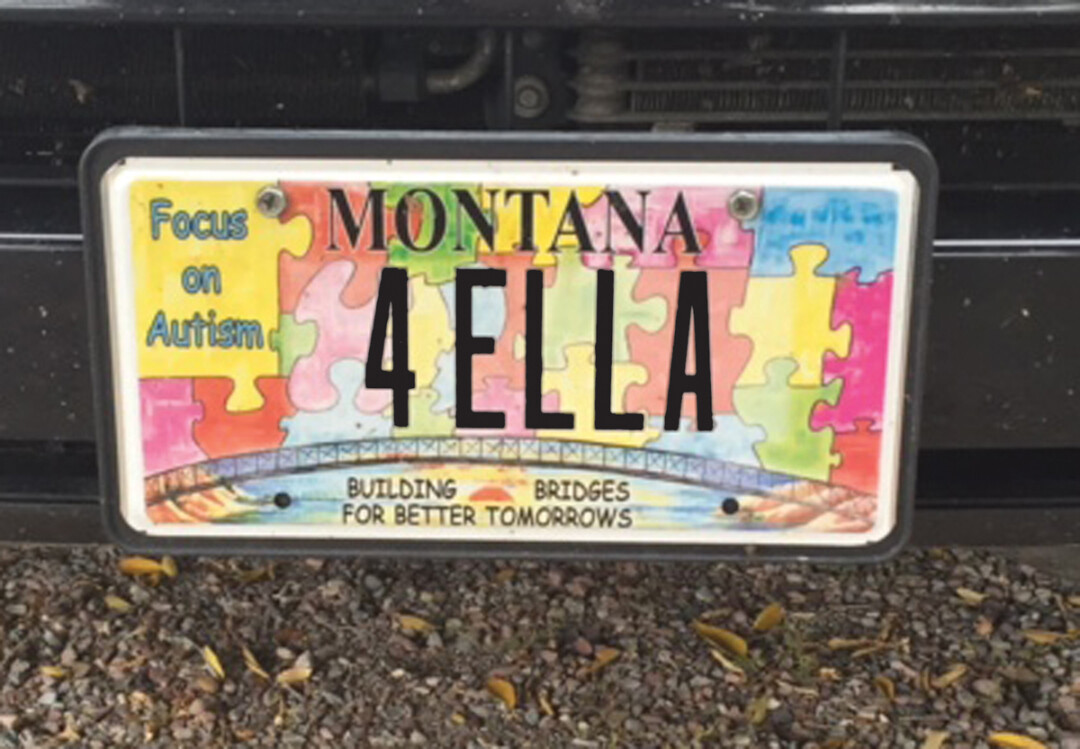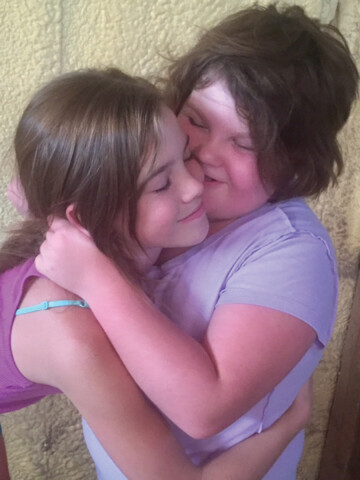Have Some Hope With Your Autism Diagnosis
Sarah Cairoli | Tuesday Nov. 1st, 2016
All the debate over diagnosis and misdiagnonis, and vaccinations contributing to the onset of autism spectrum disorder overshadows the real issue: that children and families all over the U.S. and Montana deal with the effects of autism every day. People with autism and their families need support from the community, a voice in the debate. They need advocates.
Fortunately for Montana, one of these families has stepped up and is doing all they can to advocate for people with autism, for their eight-year old, Ella. Abby Harris, Ella’s mom, works tirelessly to advocate for people diagnosed with autism spectrum disorder. She and her husband are the brains (and hearts) behind the specialized Montana license plates that raise money and awareness about autism. For every license plate sold, the Developmental Educational Assistance Program (DEAP) of Montana receives $20; so far, sales of the plate have generated $4000 to pay back the cost charged by the State for the specialty plate and about $4000 more for the organization. “One thing many might not know about the art in the plate is that the word HOPE is hidden in the puzzle pieces. That really sums up our vision for this project...to provide hope for families of autism in the state of Montana.” Harris explains.
Here, Harris describes the challenges and triumphs of autism advocacy in her own words.

Autism Advocacy
“As a parent of a child with autism, advocating happens on a daily basis. Some is larger, more public advocating, such as speaking on the importance of early intervention to a committee at the Capitol in Helena or filming a Montana Respite video (encouraging caregivers to seek out help if, and when, they need it). Being a part of the design process and plans for the autism license plate is another great advocacy experience we have had.
“But, the advocacy doesn’t end there. It’s helping the school bus driver understand how to encourage Ella to hand her coat and backpack to her when she gets on the bus, instead of THROWING her stuff AT the driver. It’s getting Ella out in the community as much as possible, so everyone knows her name, and she knows how to say “hi” and “bye” to people in the community. It’s going to the football and basketball games and explaining Ella’s behavior to her peers, so they aren’t scared or ashamed to ask us more about Ella.
“Advocating for us meant getting Ella to the local healthcare clinic 3 or 4 times a week (for months on end), trying to ease Ella’s anxieties about medical care. With the tireless help of a small town clinic, Ella has gone from a complete meltdown just stepping foot in any medical facility to having tear-free exams, no meltdowns, only smiles, 2 successful blood draws and a full panoramic dental x-ray! None of this would be possible without compassionate and understanding medical staff and someone tirelessly advocating on Ella’s behalf.
“Advocating means coaching soccer, so Ella can feel comfortable being a part of the team. It means endless IEP meetings at school, making sure our daughter’s needs are being met. It is going into Ella’s classroom and reading books about autism to her classmates, so the kids understand that when Ella flaps her hands and makes noises that sound odd to them, it’s really her comforting herself, just like their teddy bear or favorite toy comfort them.
Community Support
“Communities can play such a huge part in supporting families! I think small-town Montana communities do an especially great job of supporting families of autism. As I mentioned before, our local healthcare clinic has made an enormous impact on Ella’s life! For years they have been so patient and so kind, allowing us to come back as many times as needed, so Ella would be comfortable.
“Community support is felt going to the post office, pharmacy, grocery store or courthouse and having everyone greet Ella by name and give her a high five. It’s restaurants understanding that Ella can’t eat anything on their menu, but accepting her with open arms when she comes in to practice being around the noise of a restaurant. Another great way to show support as a community would be to create sporting teams (for younger kids especially) by collaborating with parents to adapt plays and practices so the kids with autism can participate without being overwhelmed.
“Community members looking out for the safety of autistic kids is also so important. Many kids with autism are prone to wandering. Having lots of vigilant eyes in the community can help so much with putting families’ minds at ease.
“Parents can help by talking to their kids about differences they may see in some kids and encouraging them to ask the questions they may have about their classmate or peer with autism. Knowledge is power. Understanding is so important. 
“One form of support that I think gets overlooked is the support for siblings of kids with autism. There are resources for the child with autism, but many forget that there are other kids in the family that are living very different lives than most of their peers. These siblings are often times THE BIGGEST advocates for their autistic siblings, and there’s a lot of stress and anxiety that goes along with that. I think, especially in rural Montana, a lot of these siblings don’t get a chance to interact with others kids that have autistic brothers or sisters. Planned fun days and playgroups that will connect these siblings would be an amazing asset to Montana communities. From our experience, siblings have the deepest, most personal relationships with their autistic brothers or sisters. It’s an amazingly beautiful bond. Lilly (Ella’s older sister) wants more than anything to help people understand Ella and how amazing she is; giving Lilly the tools and support to accomplish that is extremely important!
“Communities can support families by advocating for services for autistic kids and supporting those programs that do provide services, like churches offering their rooms to be used for therapy sessions. They can also support schools collaborating with the programs that provide specialty services, ensuring kids are getting the most cohesive and seamless treatments possible. Understanding the importance of collaborative funding between schools and support services is also very important in communities.”
According to Harris, Montana has several specialized services for people who have autism. However, acceptance into these programs is often limited by several factors, including age and geographic availability. But, like so many programs that do good work, funding is limited. The sale of the specialized license plates will contribute to the funding these programs so desperately need. “That’s why it’s so great to get the word out to all Montanans about this opportunity to support autism services since we know that 1 in 68 children is now diagnosed with autism,” Harris said.
| Tweet |
